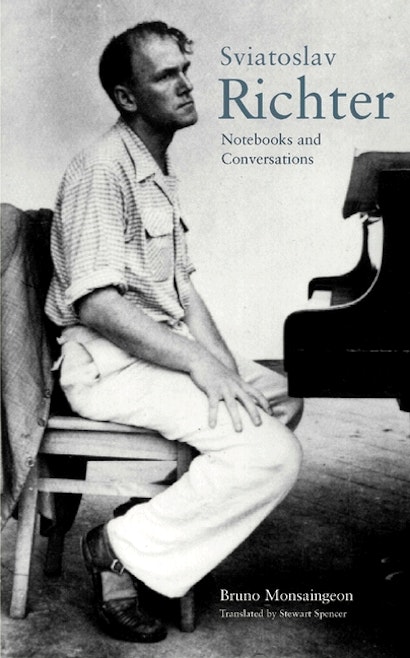Sviatoslav Richter was a dazzling performer but an intensely private man. Though world famous and revered by classical music lovers everywhere, he guarded himself and his thoughts as carefully as his talent. Fascinated, author and filmmaker Bruno Monsaingeon tried vainly for years to interview the enigmatic pianist. Richter eventually yielded, granting Monsaingeon hours of taped conversation, unlimited access to his diaries and notebooks, and, ultimately, his friendship. This book is the product of that friendship.
Richter reveals himself as a man and an artist. Unsentimentally and with his characteristic dry humor and intelligence, the musician describes his poignant childhood and spectacular career, including his tumultuous early days at the Moscow Conservatory and his triumphant 1960 tour of the United States. His laconic recounting of playing in the orchestra at Stalin’s surreal, interminable state funeral is riveting. Most important for music lovers, Richter discusses his influences and views on musical interpretation. He describes his encounters with other great Russian performers and composers, including Prokoviev, Shostakovich, Oistrakh, and Gilels. Candid sections from his personal journals offer his sober and unguarded impressions of dozens of performances and recordings—both his own and those of other musicians.
This volume offers readers the sizable pleasure of lingering in the thoughts and words of one of the most important pianists of the twentieth century. Unlike many other star performers, Richter was also an intellectual who had interesting things to say, particularly about the musician’s proper role as interpreter of the composer’s art. This alone makes the book worth reading. Sviatoslav Richter belongs on the shelves of everyone with a classical music collection and will also appeal to lovers of autobiography and admirers of Russian musical culture.
"This is a fascinating glimpse of the musical world through the eyes of one of its major practitioners."—Library Journal
"Richter himself spends 200 of these pages putting us straight as regards his recordings . . . The table of his repetoire in these Notebooks and Conversations shows he was always a subtle, inquisitive artist, who played for his own developing pleasure, not to feed the public with exactly what it gaped for."—Eric Griffiths, The Evening Standard
"This is as close, in a human and enlightening way, as the likes of thee and me are likely to get to truly towering creative (and interpretive) genius."—Michael Wolff, New York Observer
"In allowing Richter's own words to take precedence over anecdotes or analysis, a clear view of Richter's musical life emerges . . . Richter develops from a mischievous-looking young man to the chiseled, inscrutable icon of his later years."—The Economist
"Music lovers should be grateful, for along with [Richter's] comments on music and musicians, it displays the foibles, opinions, skills, joys, and sorrows of the publicly reticent keyboard titan. Lavishly illustrated with photographs, it should enlighten and delight lovers of the piano and the pianist."—Booklist
"This book is almost impossible to put down . . . Its target is anyone who wishes to sit at the foot of the Richter legend."—Andrew Clark, Financial Times
"Here is one of the great pianists of the 20th century, who was justly welcomed with adulation any time he appeared, who never once, in dozens of recordings, seemed to doubt what he was doing or what the music was saying."—Edward Rothstein, New York Times Book Review
"Few in the 20th century loomed so tall artistically but lived more eccentrically than the late Russian pianist Sviatoslav Richter. . . . Was there ever a more singular musician?. . . In what initially appears to be a mere appendix of the book, there is the most insightful, engaging part of all: excerpts from Richter's personal notebooks. . . . This is the heart of music-making and an artistic life. To understand [Richter] is to better understand all of those individualists of the keyboard."—David Patrick Stearns, The Philadelphia Inquirer
"[In this well-made book] . . . Richter appears part monk, part showman, part unworldly, part shrewd. . . . Richter's notebooks, reproduced in the second half of the book, slag off, with gusto, other musicians, recordings, conductors, and, to be fair, himself."—Richard Coles, Times Literary Supplement
"Enlivened throughout by Richter's intelligence and his eccentric humor, particularly in the last section, a diary where he has made notes on the music he is listening to. . . . Characteristically, his sternest criticisms are reserved for his own recordings."—The New Yorker
"Quintessential Richter . . . highly cultivated, perceptive but caustic, particularly about what he perceived as superficiality and egotism. . . . Determination, sincerity, strength in abundance. Everything about Richter seemed outsized."—Michael Kimmelman, The New York Review of Books
"This book is almost impossible to put down. . . . The strength of Richter's personality, his obstinacy, and his candour, leap from every page."—Andrew Clark, Financial Times
"The book will . . . be of interest to anyone interested in Richter's ideas and personality.""—Paul Orgel, Notes
"The reader is presented with an intimate portrait. . . . Monsaingeon has put together a volume that gives the reader a close-up look at an internationally known musician recognized as one of the most important pianists in the last half of the 20th century."—Choice
"In these pages, we hear only Richter's distinctive voice, unpretentious, ironic, at times defensive, humorous, convincingly sincere, as brutally candid about his foibles, his performances, and his preferences as about the strengths and failings of his colleagues. A man of determined privacy who shunned interviews, he reveals himself almost inadvertently in his recollections. This book is indispensable to anyone interested in a magisterial artist like Richter. For the music lover and record collector, the appendices are extremely valuable."—Beth Archer Brombert, author of Eduard Manet: Rebel in a Frock Coat

